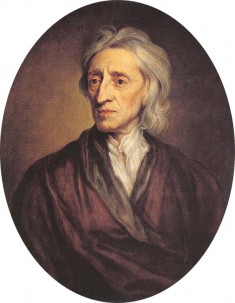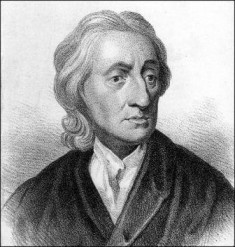| John Locke | |
|---|---|
 |
|
| Philosopher | |
| Specialty | Enlightenment |
| Born | Aug. 29, 1632 Wrington, Somerset, England |
| Died | Oct. 28, 1704 (at age 72) Essex, England |
| Nationality | English |
John Locke was one of the more important political philosophers in world history. He was hugely influential on the framers of the American Constitution and he was also a major believer and proponent of natural laws and the social contract. His masterful writing has allowed him to achieve the honor of being considered the Father of Classical Liberalism.
Locke’s Early Life
John Locke was born on August 29, 1632, in Wrington, England. He was born of humble beginnings as his father was a country lawyer in the very small town. When he grew older, Locke enrolled at Westminster School in London and then he moved and continued his studies at Christ Church, Oxford. Locke acquired both a Bachelor’s Degree and a Master’s Degree. In 1674, he acquired a Bachelor’s of Medicine.
Despite his academic achievements, Locke did not like studying the classics, which comprised a large part of his studies. He did have a huge interest in the work of Rene Descartes, however. Locke was very self-motivated in his study of contemporary philosophy.
Locke and Political Philosophy
During Locke’s studies, he met Lord Anthony Ashley Cooper who was seeking help for liver disease. Locke contributed to the treatment of Cooper. Cooper was a very influential person and founder of the Whig movement. In fact, Cooper had tremendous influence on Locke’s political ideology.
Through the prodding of Cooper, Locke would put pen to paper and compose his first political work, Two Treatises of Government. This work was an attack on the notion of rule by total monarchy, a theory made popular by philosophers such as Hobbes.
While the concept of freedom from the rule of a monarchy is the norm today, in Locke’s time it was quite revolutionary. Locke’s beliefs likely did not endear him to the powers that be. In fact, he was suspected of being part of the Rye House Plot to assassinate King Charles II of England. There is no proof Locke was involved with such a plot, but he was concerned for his safety enough to flee to the Netherlands. He eventually was able to return to England in 1688.
Locke’s Philosophical Works
 Locke published a number of major works throughout his lifetime. An Essay Concerning Human Understanding (1689) was his seminal work and a work that would forever change the way humans could understand the process of human thought and reason. The work revolved around theories of empiricism and also looked very closely at what was within the realm of human understanding and what may lie outside of it.
Locke published a number of major works throughout his lifetime. An Essay Concerning Human Understanding (1689) was his seminal work and a work that would forever change the way humans could understand the process of human thought and reason. The work revolved around theories of empiricism and also looked very closely at what was within the realm of human understanding and what may lie outside of it.
The Second Treatise of Government was hugely influential on political theories and ideologies. What was so amazing about this work was that it brought forth the notion of natural laws and that people deserved to live free. The government was supposed to serve the will of the people through maintaining a social contract.
Born of the Age of Enlightenment, the concept of the social contract revolves around the relationship between the government and the governed. As a rule, the government is to protect and serve the needs of the governed, according to Locke. Unless a government did this, then the government was not a legitimate one. The theories put forth in this treatise would have a tremendous influence on the founding fathers of the United States.
A Letter Concerning Toleration is known for Locke’s professing the need for a separation of church and state. This was not so much an anti-religious sentiment as much as it was a screed that was rooted in attacking authoritarianism. Locke was strongly antagonistic to excessive authoritarianism in all its forms. Authoritarianism would certainly be antithetical to the entire theory of the social contract.
Other works he would publish included Some Thoughts Concerning Education (1693), The Reasonableness of Christianity, as Delivered in the Scriptures (1695), and A Vindication of the Reasonableness of Christianity (1695).
Later Years and Death
John Locke eventually started to suffer from severe asthma attacks. These attacks had a very negative effect on his overall health, which did get worse as time progressed. Locke retired to Essex, England, and on October 28, 1704, he passed away. After his passing, many works of his were published posthumously.